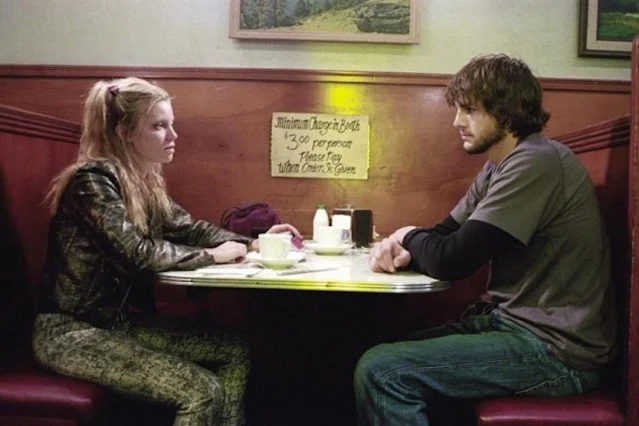Throughout the movie, the concept of the Butterfly Effect takes center stage, illustrating how even small changes in the past can have far-reaching and unforeseen repercussions on the present and future. By examining the themes and examples from the film, we gain insights into the intricate dynamics of cause and effect, the influence of memory on identity, the yearning for redemption, and the philosophical implications of determinism and free will.
Let us delve into the depths of these themes and explore the complexities unveiled in "The Butterfly Effect." movie.
Cause and Effect:
One example of the Butterfly Effect in the film is when Evan alters a childhood memory where he and his friends put a firecracker in a mailbox. In the original memory, the mailbox explosion caused some damage, but no severe consequences. However, when Evan changes this event, it leads to his friend's father being arrested for a crime he didn't commit. This alteration has a ripple effect on his friend, resulting in psychological issues and a tragic fate.
Another instance occurs when Evan goes back in time to save his beloved dog from being burned by his sadistic father. Although he successfully rescues the dog, his father's attention turns towards him, leading to a life of physical and psychological abuse for Evan. This highlights how even well-intentioned changes can have unforeseen and negative consequences.
Memory and Identity:
Throughout the film, Evan grapples with the impact of his altered memories on his own identity. When he changes significant events from his childhood, he experiences different versions of himself in the present. This exploration of memory and identity raises questions about how past experiences shape who we become and the choices we make.
An example of this is when Evan alters the memory of a traumatic event involving his friend Kayleigh. In one version, he saves her from her abusive father, but it leads to her living a life of prostitution and addiction. In another version, he chooses not to intervene, and Kayleigh becomes more stable but still faces her own set of challenges. This showcases the intricate relationship between memory, identity, and the complex consequences of altering the past.
Redemption and Second Chances:
Evan's journey throughout the film is driven by a desire for redemption and a belief that he can fix the mistakes of the past. However, he learns that altering events comes with unintended consequences and that some things cannot be fixed or undone.
An example is Evan's attempt to mend his relationship with his father. In one iteration, he successfully prevents his father from going to prison for alleged child molestation. However, this change results in his father becoming a serial killer. Evan's attempts to redeem his father's reputation ultimately lead to tragic outcomes and further complicate his own sense of guilt and responsibility.
Determinism versus Free Will:
The film raises philosophical questions about determinism versus free will. Initially, Evan believes that he has the power to change the course of events through his time-traveling abilities. However, as he continues to alter the past, he discovers a recurring pattern of tragic events, suggesting that events are predetermined or bound by a complex system beyond his control. For instance, despite his efforts to save Kayleigh from a life of abuse and trauma by altering events, she continues to face different forms of suffering, indicating the limitations of his free will and the presence of a predetermined path.
What impact does the butterfly effect have on the ending of the theatrical release of the movie?
The alternate ending of The Butterfly Effect released on DVD explained
In "The Butterfly Effect" Director's Cut, an alternative ending is presented, diverging from the original theatrical release. This ending introduces a darker twist to Evan's journey and offers a glimpse into a timeline where he takes an extreme measure to prevent the multi-generational curse from continuing.
In this alternative ending, Evan finds himself with severe brain damage and realizes that he will soon be confined to a psychiatric facility, where he will lose access to his time-traveling ability. Desperate to change the timeline, he resorts to drastic action. He watches a family video, witnessing his mother just before she is about to give birth to him. With a profound realization, Evan makes the fateful decision to travel back to that moment and strangle himself in the womb using his own umbilical cord. By sacrificing his own existence, Evan aims to break the cycle of tragedy and prevent the multi-generational curse from affecting anyone else.
The addition of a scene featuring a psychic palm reader telling Evan that he has "no lifeline" and that he does "not belong to this world" foreshadows this unsettling ending. It suggests a belief that Evan's life is destined to be plagued by tragedy and that his ultimate act is an attempt to sever his ties to this world and prevent further suffering.
Following Evan's drastic action, the alternative ending portrays Kayleigh as a child in the new timeline, having chosen to live with her mother instead of her father. This suggests a brighter outcome for her, indicating that the lives of other childhood characters have also become more loving and less tragic. The ending montage offers a glimpse into this new timeline, implying that Evan's sacrifice has had a positive impact on those around him.
By incorporating this alternative ending, the Director's Cut of "The Butterfly Effect" explores the depths of Evan's desperation and his willingness to take extreme measures to break the cycle of tragedy. It delves into darker themes of sacrifice and the consequences of altering one's own existence to protect others from suffering. This alternative ending presents a haunting and thought-provoking conclusion that challenges viewers to contemplate the depths of human agency and the lengths one may go to alter the course of their own life and the lives of those they care about.
















